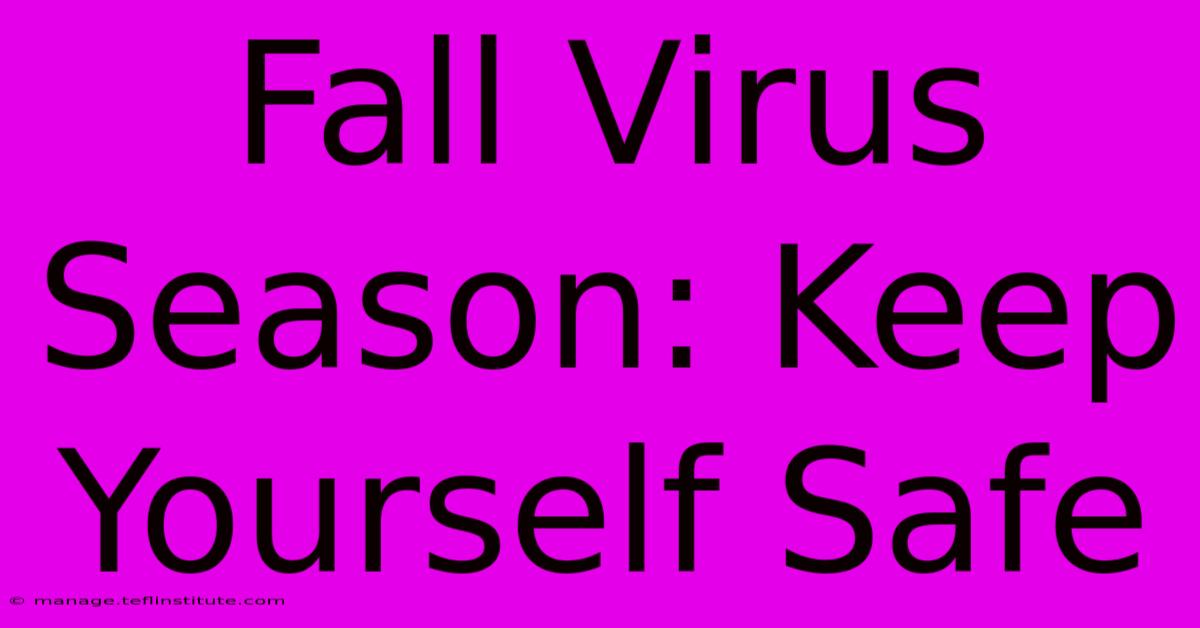Fall Virus Season: Keep Yourself Safe

Table of Contents
Fall Virus Season: Keep Yourself Safe
As the leaves change and the air turns crisp, it's not just the scenery that shifts. Fall also marks the beginning of a surge in viral infections, setting the stage for a season of sniffles, coughs, and potential complications. Understanding the risks and taking proactive steps can significantly reduce your chances of falling victim to these unwelcome guests.
The Fall Flu Frenzy and Beyond:
Fall's cooler temperatures and increased time spent indoors create the perfect breeding ground for viruses. The most well-known culprit is influenza (the flu), a highly contagious respiratory illness. However, it's not alone. Other common viruses making their presence known include:
- Respiratory Syncytial Virus (RSV): Especially prevalent in young children and older adults, RSV can cause bronchiolitis (inflammation of the small airways in the lungs) and pneumonia.
- Rhinoviruses (Common Cold): While less severe than the flu or RSV, the common cold can still disrupt daily life with its persistent sniffles and congestion.
- Adenoviruses: These viruses can cause a range of illnesses, from mild cold symptoms to more serious conditions like pneumonia and conjunctivitis (pink eye).
Boosting Your Defenses: Proactive Measures for a Healthy Fall:
Staying healthy during fall virus season isn't about avoiding all social interaction; it's about making informed choices to minimize your risk. Here's how:
-
Get Vaccinated: The most effective way to protect yourself against the flu is to get the annual flu vaccine. Talk to your doctor about the best vaccine for you, especially if you're in a high-risk group (older adults, pregnant women, people with chronic health conditions). While there isn't a vaccine for the common cold or RSV, vaccination against other respiratory illnesses can help reduce your overall risk of infection.
-
Practice Good Hygiene: This is your first line of defense. Wash your hands frequently with soap and water for at least 20 seconds, especially after being in public places or before eating. Use hand sanitizer when soap and water aren't available. Avoid touching your face, particularly your eyes, nose, and mouth.
-
Maintain Social Distance: When illness is prevalent, maintaining a safe distance from people who are coughing or sneezing can help reduce transmission.
-
Boost Your Immunity: A healthy lifestyle is crucial. Eat a balanced diet rich in fruits, vegetables, and whole grains. Get enough sleep (7-8 hours per night). Manage stress through exercise, meditation, or other relaxation techniques.
-
Stay Hydrated: Drinking plenty of fluids helps thin mucus and makes it easier to clear from your respiratory system.
-
Clean and Disinfect: Regularly clean and disinfect frequently touched surfaces like doorknobs, light switches, and countertops.
-
Know When to Seek Medical Attention: If you experience severe symptoms such as difficulty breathing, chest pain, high fever, or persistent vomiting, seek immediate medical attention.
Recognizing the Symptoms:
Knowing the signs and symptoms of viral infections is key to early intervention. Common symptoms include:
- Fever
- Cough
- Sore throat
- Runny or stuffy nose
- Body aches
- Fatigue
- Headache
Prevention is Key:
While a completely virus-free fall might be unrealistic, proactive measures can dramatically reduce your risk. By adopting these strategies, you can increase your chances of enjoying the season's beauty and festivities without succumbing to the sniffles. Remember, a healthy fall starts with a proactive approach to prevention.

Thank you for visiting our website wich cover about Fall Virus Season: Keep Yourself Safe . We hope the information provided has been useful to you. Feel free to contact us if you have any questions or need further assistance. See you next time and dont miss to bookmark.
Featured Posts
-
Pakistan Vs Australia 1st T20 I Recap
Nov 15, 2024
-
Uefa Probe After Premier League Refereeing Blunder
Nov 15, 2024
-
Player Ratings Englands 3 0 Nations League Win
Nov 15, 2024
-
England Vs Greece Match Prediction And Time
Nov 15, 2024
Latest Posts
-
Mescal Lands Producer Credit For Film
Nov 15, 2024
-
Paul Mescals New Project Producer
Nov 15, 2024
-
Paul Mescal Takes On Producing Role
Nov 15, 2024
-
Cartier Shine Paul Mescals Red Carpet Style
Nov 15, 2024
-
Paul Mescal Cartiers Newest Ambassador
Nov 15, 2024
-
Cartier Style Paul Mescals Red Carpet Look
Nov 15, 2024
